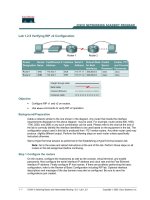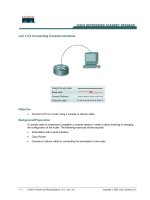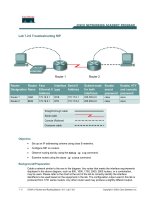Tài liệu Lab 6.2.8 Password Recovery Procedure on a Catalyst 2900 Series Switches docx
Bạn đang xem bản rút gọn của tài liệu. Xem và tải ngay bản đầy đủ của tài liệu tại đây (251.39 KB, 6 trang )
Lab 6.2.8 Password Recovery Procedure on a Catalyst 2900 Series Switches
Objective
• Create and verify a basic switch configuration verify it.
• Change passwords to the password recovery procedure be performed.
Background / Preparation
Cable a network similar to the one in the diagram. The configuration output used in this lab is
produced from a 2950 series switch. Any other switch used may produce different output. The
following steps are to be executed on each switch unless specifically instructed otherwise.
Start a HyperTerminal session.
Note: Go to the erase and reload instructions at the end of this lab. Perform those steps on all
switches in this lab assignment before continuing.
Step 1 Configure the switch
Configure the hostname, access, and command mode passwords, as well as the management LAN
settings. These values are shown in the chart. If problems occur while performing this configuration,
refer to the Basic Switch Configuration lab.
1 - 6 CCNA 3: Switching Basics and Intermediate Routing v 3.0 - Lab 6.2.8 Copyright 2003, Cisco Systems, Inc.
Step 2 Configure the host attached to the switch
Configure the host to use the same subnet for the address, mask, and default gateway as on the
switch.
Step 3 Verify connectivity
a. To verify that the host and switch are correctly configured, ping the switch IP address from the
host.
b. Was the ping successful? ____________________________________________________
c. If the answer is no, troubleshoot the host and switch configurations.
Step 4 Reset the console password
a. Have a classmate change the console and VTY passwords on the switch. Save the changes to
the startup-config file and reload the switch.
b. Now without knowing the passwords, try to gain access to the switch.
Step 5 Recover access to the switch (2900XL is essentially the same.)
a. Make sure that a PC is connected to the console port and a HyperTerminal window is open.
b. Turn the switch off. Turn it back on while holding down the “MODE” button on the front of the
switch at the same time that the switch is powered on. Release the “MODE” button after the
STAT LED goes out.
c. The following output should be displayed:
C2950 Boot Loader (C2950-HBOOT-M) Version 12.1(11r)EA1, RELEASE
SOFTWARE (fc1)
Compiled Mon 22-Jul-02 18:57 by antonino
WS-C2950-24 starting
Base ethernet MAC Address: 00:0a:b7:72:2b:40
Xmodem file system is available.
d. The system has been interrupted prior to initializing the
flash filesystem. The following commands will initialize
the flash filesystem, and finish loading the operating
system software:
Type flash_init
Type load_helper
Type dir flash: (do not forget to type the : (colon) after the word
flash)
Enter the commands required to initialize the flash file system. First type flash_init, then
type load_helper. Finally type dir flash:
Note: Do not forget to type the colon (:) after the word flash.
2 - 6 CCNA 3: Switching Basics and Intermediate Routing v 3.0 - Lab 6.2.8 Copyright 2003, Cisco Systems, Inc.
Type rename flash:config.text flash:config.old to rename the configuration file.
This file contains the password definition.
Step 6 Restart the system
a. Type boot to boot the system.
b. Enter N at the following prompt to start the Setup program:
Continue with the configuration dialog? [yes/no] : N
c. Type rename flash:config.old flash:config.text to rename the configuration file
with its original name at the privileged exec mode prompt.
d. Copy the configuration file into memory as follows:
Switch#copy flash:config.text system:running-config
Source filename [config.text]?[enter]
Destination filename [running-config][enter]
e. The configuration file is now reloaded. Change the old unknown passwords as follows:
ALSwitch#configure terminal
ALSwitch(config)#no enable secret
ALSwitch(config)#enable password Cisco
ALSwitch(config)#line console 0
ALSwitch(config-line)#password cisco
ALSwitch(config-line)#exit
ALSwitch(config)#line vty 0 15
ALSwitch(config-line)#password cisco
ALSwitch(config-line)#exit
ALSwitch(config)#exit
ALSwitch#copy running-config startup-config
Destination filename [startup-config]?[enter]
Building configuration
[OK]
ALSwitch#
f. Power cycle the switch and verify that the passwords are now functional. If not, repeat the
procedure.
g. Once the steps are completed, logoff, by typing exit, and turn all the devices off. Then remove
and store the cables and adapter.
1900: from cisco.com
Note: This section does not apply to those Catalyst 2800 switches that do not have the Mode button
in their front panel. To recover the password on those switches, please refer to the Firmware Version
1.09 and Earlier section listed at the end of this document.
h. Check the boot firmware version number from the Systems Engineering menu. To access the
Systems Engineering menu, follow the procedure below:
1. Disconnect the power cord from the rear panel.
2. Press and hold the Mode button on the front panel.
3. Power-cycle the switch.
3 - 6 CCNA 3: Switching Basics and Intermediate Routing v 3.0 - Lab 6.2.8 Copyright 2003, Cisco Systems, Inc.
4. Release the Mode button one or two seconds after the LED above port 1x goes off.
Cisco Systems Diagnostic Console
Copyright(c) Cisco Systems, Inc. 1999
All rights reserved.
Ethernet Address: 00-E0-1E-7E-B4-40
Press Enter to continue.
5. Press Enter to display the Diagnostic Console - Systems Engineering menu.
You will see the following Systems Engineering menu:
Diagnostic Console - Systems Engineering
Operation firmware version: 8.00.00 Status: valid
Boot firmware version: 3.02
[C] Continue with standard system start up
[U] Upgrade operation firmware (XMODEM)
[S] System Debug Interface
Enter Selection:
6. The bold letters above show the Boot firmware version.
Firmware Version 1.10 and Later
Note: If the shipping date is before June 1997, please refer to the Firmware Version 1.09
and
Earlier section of this document, and contact the Cisco Technical Assistance Center (TAC) for
password recovery.
Clearing the Password
To clear your password, follow the steps below:
1. Power-cycle the switch.
After POST completes, the following prompt displays:
Do you wish to clear the passwords? [Y]es or [N]o:
Note: You have ten seconds to respond. If you don't respond within that time, the
Management Console Logon screen displays. You cannot change this waiting period.
2. Enter [Y]es to delete the existing password from Nonvolatile RAM (NVRAM).
Note: If you type [N]o, the existing password remains valid.
3. Assign a password from the switch management interfaces (management console or
Command Line Interface (CLI)).
Viewing the Password
For firmware versions between 1.10 and 3.02, you can view the password you are trying to recover
(instead of clearing it as described in the previous section).
4 - 6 CCNA 3: Switching Basics and Intermediate Routing v 3.0 - Lab 6.2.8 Copyright 2003, Cisco Systems, Inc.
1. Access the diagnostic console.
a. Press and hold the Mode button.
b. Power-cycle the switch.
c. Release the Mode button one or two seconds after the LED above port 1x
goes off.
You will see the following logon screen:
Cisco Systems Diagnostic Console
Copyright(c) Cisco Systems, Inc. 1999
All rights reserved.
Ethernet Address: 00-E0-1E-7E-B4-40
d. Press Enter to continue.
2. Press Enter and select the [S] option on the Diagnostic Console - Systems
Engineering menu, and then select the [V] option on the Diagnostic Console -
System Debug Interface menu to display the management console password.
3. If you want to change the password, select the [M] option on the Console Settings
menu
Firmware Version 1.09 and Earlier
Note: If the shipping date is before June 1997, please gather the information listed in this section,
and contact the Cisco Technical Assistance Center (TAC)
for password recovery.
Note: This section is also applicable for those Catalyst 2800 switches that do not have the Mode
button in their front panel.
To recover your password, follow the steps below:
1. Contact the Cisco TAC for the factory-installed password.
2. Provide the serial number and/or Media Access Control (MAC) address of the
switch.
The serial number is usually located on the back of the unit. To obtain the MAC address, remove the
cover and read the Ethernet address of the Programmable Read-Only Memory (PROM).
5 - 6 CCNA 3: Switching Basics and Intermediate Routing v 3.0 - Lab 6.2.8 Copyright 2003, Cisco Systems, Inc.
Erasing and reloading the Switch
Enter into the privileged exec mode by typing enable.
If prompted for a password, enter class (if that does not work, ask the instructor).
Switch>enable
Switch#delete flash:vlan.dat
Delete filename [vlan.dat]?[enter]
Delete flash:vlan.dat? [confirm] [enter]
If there was no VLAN file, this message is displayed.
%Error deleting flash:vlan.dat (No such file or directory)
At the privileged exec mode enter the command erase startup-config.
Switch#erase startup-config
The responding line prompt will be:
Erasing the nvram filesystem will remove all files! Continue? [confirm]
Press Enter to confirm.
The response should be:
Erase of nvram: complete
Now at the privileged exec mode enter the command reload.
Switch(config)#reload
The responding line prompt will be:
System configuration has been modified. Save? [yes/no]:
Type n and then Enter.
The responding line prompt will be:
Proceed with reload? [confirm] [Enter]
In the first line of the response will be:
Reload requested by console.
After the Switch has reloaded the line prompt will be:
Would you like to enter the initial configuration dialog? [yes/no]:
Type n and then Enter.
The responding line prompt will be:
Press RETURN to get started! [Enter]
6 - 6 CCNA 3: Switching Basics and Intermediate Routing v 3.0 - Lab 6.2.8 Copyright 2003, Cisco Systems, Inc.









